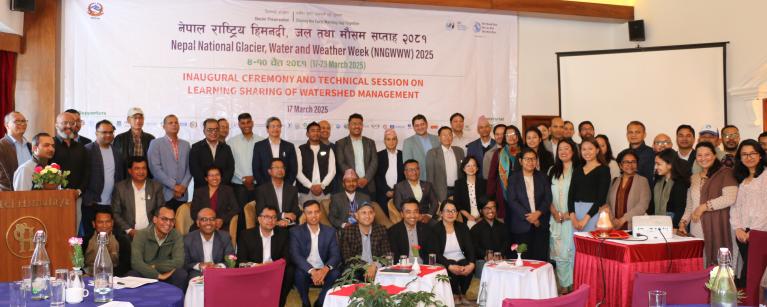The “Nepal National Glacier, Water and Weather Week (NNGWWW) 2025” inaugural ceremony in Kathmandu on March 17, 2025, saw a pivotal moment, as Community of Practice (CoP) on Water Resource Management members signed a Terms of Reference (ToR) to enhance water resource management. This landmark agreement strengthens Nepal’s water resource community, promoting sustainable and climate-resilient water governance.
The Water and Energy Commission Secretariat (WECS) had spearheaded the creation of the Community of Practice (CoP) on Water Resource Management on October 30, 2024, assembling more than 30 key figures in Nepal's water sector. Oxfam is facilitating the CoP's operationalization as a secretariat, thereby ensuring a platform for effective knowledge sharing and collaborative initiatives.
The event on Monday was attended by Hon'ble Minister of Energy, Water Resources and Irrigation, Dipak Khadka, and WECS Secretary, Madhu Bhetwal, underscoring the government’s commitment to systematic change in water management.
During the event, Jagadishwar Karmacharya, Joint-Secretary at WECS, outlined the scheduled activities for event. Subsequently, Kapil Gnawali, Senior Hydrologist at WECS spoke about the necessity and goals of the CoP and called upon stakeholders to endorse the ToR through their signatures.
Minister Dipak Khadka emphasized the critical, yet often overlooked, importance of glacier conservation. He He underscored the need for the government to concentrate on policy making and practical responses to the growing threat posed by climate change, including the rapid decline of glaciers and changing meteorological conditions. (https://risingnepaldaily.com/news/58791 )
Likewise, WECS Secretary Madhu Bhetwal reinforced the importance of collective action. On behalf of WECS, he expressed gratitude to all participating organizations and individuals. He particularly emphasized the necessity of collaborative efforts to mitigate climate change impacts on glaciers, which directly affect freshwater resources.
Dhiraj Pradhananga, President of Small Earth Nepal (SEN), NNGWWW secretariat and UNESCO Chair in Mountain Water Sustainability (Tribhuvan University) Chairholder, expressed his pride in the ongoing success of Water Week. He noted that SEN, in partnership with WECS and other organizations, had initiated this event 16 years prior.
Tripti Rai, Oxfam in Nepal's Country Director, emphasized the institutionalization of the Community of Practice (CoP) as a crucial milestone to overcome the current water and climate crisis which requires collective action. She stated, "The signing of the CoP is a significant achievement that strengthens solidarity in water resource management, paving the way for a more resilient and sustainable future." She also highlighted Oxfam's support through projects like Transboundary Rivers of South Asia and Alternative Management Model and stressed the need for tangible solutions that involve inclusive participation of youth and women, collaborative partnerships, and accessible early warning systems. "Oxfam remains committed to a people-centered, human rights approach in all our work ensuring access, equity, and justice for all."
Similarly, Manohara Khadka, Country Representative of IWMI Nepal, emphasized the need for science-driven innovations in water management while, Arun B. Shrestha, Lead Climate and Environmental Risks at ICIMOD, highlighted ICIMOD's support for policy advocacy, stakeholder capacity building in River Basin and Community-based Disaster Risk Management (CBDRM) training, and the development of climate-resilient guidelines for hydropower risk reduction in the Hindu Kush Himalaya.
The event included a technical session dedicated to sharing knowledge and insights gained from Rangoon Watershed Management initiative.
The session featured Oxfam in Nepal’s Program Manager, Rajan Subedi's presentation on the Rangoon Watershed Management project's outcomes, including governance innovations, conflict resolution, data management, and accounting tools developed together by WECS, Oxfam, and RUWDUC. He highlighted the crucial role of local government contributions in the project's success. the vital role of local government.
Mayor Bharat Badayar of Parshuram Municipality, Dadeldhura district shared his experience in developing a fair water-sharing governance structure and addressed challenges related to revenue collection and gravel extraction, advocating for context-specific policies. He concluded by inviting participants to experience rafting in the Mahakali River.
The event concluded with Secretary Madhu Bhetwal outlining WECS's commitment to replicate Rangoon Watershed learnings in other river basins. He also emphasized the importance of integrating the GIS-based data portal into WECS's decision-making system, believing it would enhance water resource management at both national and local levels in Nepal.
Join the Community of Practice:
All institutions working in water resource management are invited to join the Community of Practice (CoP) and contribute to Nepal’s water governance transformation.
📅 Next CoP Meeting: April 28, 2025
📩 For more details, contact: Rajan Subedi, Program Manager – River Basins, Oxfam in Nepal rasubedi@oxfam.org.uk
